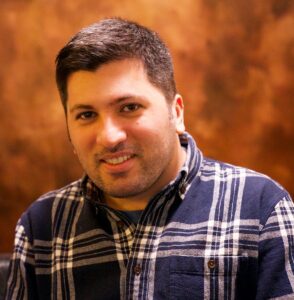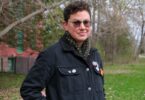There was a time when Jubin’s dad used to run a reputable coffee store at the heart of Tehran’s bazaar. His cheques never bounced. His customers always came back for more. His name Farhad—meaning helper—had become synonymous with decency among his colleagues. They had even nicknamed him amin-e bazaar, the bazaar’s trusted confidant. But this afternoon, an email from Artin, Jubin’s younger brother, had informed him that their 73-year-old dad had been killed. “Our phones are most likely being tapped by the government,” Jubin read the unbreakable train of Persian letters that appeared on his phone screen while sitting on the bed inside Pouria and Leyla’s guest room. His eyes cut over to the floor, fixated on the rays of Massachusetts summer sunshine that had penetrated the blinds. With a wince, he remembered the last thing he’d said to his dad: “You’re a selfish prick.”
Pouria and Leyla were both at work. This wasn’t some twenty years ago when together with Jubin, the three of them would fool around on the campus of Amir Kabir University, where they all had majored in electrical engineering and where all invidious comparisons would have been meaningless. Now married and two months pregnant with their first child, Pouria and Leyla had everything Jubin had ever wanted: American passports; graduate degrees in software engineering from MIT; a four-bedroom duplex just outside Boston; and jobs that each paid more than $120,000 a year. “You’ve got it all going for you,” Jubin always told them with a mix of elation and envy. If his dad’s depleted bank account hadn’t worked against him during the visa approval process, he would have been able to follow through with his admission offer from Northeastern to study robotics in his early twenties; instead, he ended up taking a dead-end job at an Iranian electrical company for nearly two decades.
It was the passing of Jubin’s mother from leukemia that had left the family careening off the cliff, that had impelled Jubin’s dad to ask friends to fill in for him at the store, thrusting this previously principled man into staying out past midnight and spending money on gambling and bootleg alcohol. In less than five years, he would find himself exiled to a small shop in an obscure corner of the bazaar’s winding alleyways, answering to people who mostly asked him for directions. Once Jubin entered his junior year, and Artin was about to start college, the family had to part ways with the affluent neighborhoods of northern Tehran and settle for a two-bedroom rental in the southwestern part of town. There, Jubin treated home as merely a place for the night’s sleep.
◊ ◊ ◊
In the evening, Pouria and Leyla arrived home with bulging Whole Foods bags in their hands, chattering at the entryway. “My boss asked me this morning if women in Iran are allowed to file for divorce,” Pouria guffawed.
“What a stupid question,” Leyla said. “They always think that Iran is as bad as Saudi Arabia.”
Sitting with a round-shouldered slouch at the dining table, Jubin had his hands and eyes glued to a steaming mug of coffee. Pouria walked to the kitchen, carrying the bags to the fridge before opening its spacious doors unlocking a chamber. Once he put the apples, bananas, and avocados away, he held a stemless glass under the water dispenser and pushed the button. Leyla picked up the remote and turned on the TV to watch the latest local news as she always did upon arriving home.
“How’s it going, buddy?” Pouria turned to Jubin.
“My dad’s been murdered,” Jubin blurted out without looking at either Pouria or Leyla.
Leyla froze in the middle of the room, dropping the remote like a hot dish. Pouria stood by the fridge, his six-foot frame resembling a living statue, a half-full glass still in his hand. He approached Jubin with hesitation. Leyla rushed to the kitchen in tears. They stood over Jubin like parents whose child has been bullied at school.
“I’m so sorry,” Pouria placed a hand on Jubin’s forearm, “I honestly don’t know what to say.”
“How did this happen?” Leyla sobbed.
“Looks like two bulky men from Ettela’t showed up at his shop. They beat him up so badly he died on the way to the hospital,” Jubin said in a monotone.
“Why would they do that to him?” Pouria asked.
“He was Kurdish, after all. They must have had problems with his Kurdish activism.”
“What kind of activism?” Leyla asked, catching her breath.
“Fighting for the rights of the Kurds and all that jazz.”
“What are you going to do now?” Leyla asked.
“What can I do?” Jubin retorted. “I will have to apply for asylum.”
“But obtaining asylum is not that easy,” Leyla said.
“Stop the crying, honey,” said Pouria, handing Leyla the glass of water. “It’s not good for you.”
◊ ◊ ◊
Ever since filing for his asylum in July, all Jubin did was take the T from Brighton to Boston early in the morning and wander the city on foot the whole day. His first stop was Newbury Street, its shimmering shop windows and lush trees reminding him of his childhood neighbourhood in Tehran, its quaint cafés never failing to lasso him in for a cup of black coffee. From there, he would make his way to Cambridge and meander through its alleys, taking photos with his phone to keep a record of his days. He would always stop and contemplate the same modular two-story house near First Church. The house was almost unremarkable, except for the small flowerpot on the steps with a sign—planted like a flag—declaring in English, Spanish, and Persian, “No matter where you come from, as long as you are here with us.” Jubin imagined the friendly face of an American woman, grey-haired, possibly in her late-seventies, who must have visited Iran before the 1979 Islamic Revolution, who had Iranian friends—whom she would probably refer to as Persian—and whose favorite Persian food must be ghorme-sabzi.
Admiring houses didn’t always go well, though. Once, while snapping a picture of a Victorian-style house, an old white man appeared on the porch and threatened to call the cops on the dark-haired, olive-skinned Jubin photographing his home. Jubin apologized for a whole minute and continued with his walk. He would spend the balance of the day bouncing between coffee shops and parks, libraries and bustling plazas. His last stop of the day was the Charles where he sat on a bench watching the sun go down while people jogged or walked or talked past him, and ducks went gliding through the water before his eyes.
Occasionally, for an early dinner, he would have a tortilla wrap at a cheap Mexican eatery near Harvard Square, brushing up on his stale Spanish by listening to the intoning conversations around him. He had learned the language after falling in love with Elmira—a Spanish lit major—in his early twenties. In a little over two months, Jubin spoke the language with such ease that it confounded Elmira. The two of them argued frequently over Jubin’s smoking dependence, which had deteriorated because of frequent dustups with his dad. “You can’t care about yourself and don’t care about me,” Elmira had said, “otherwise, you’d quit smoking in a heartbeat.” Jubin explained to her that smoking made him feel better, that it offered relief from his otherwise “shitty life.” Eventually, Elmira left Jubin, but Spanish stayed. Nearing his forties now, however, Jubin was better at understanding the language than speaking it.
◊ ◊ ◊
After a week of discovering Boston like he’d never imagined, Jubin found himself listening to Pouria’s words of hope.
“Things will change in Iran,” Pouria insisted. “You will definitely get to go back someday.”
Jubin couldn’t help himself. Standing in the middle of living room, he looked around the airy house. “Easy for you to say because you’ve never had a single bump in your entire life.”
In a few days, the daily exchanges in the house between Jubin and his now alien friends became limited to dinner time and occasionally breakfast. Soon, Jubin refused to leave his room at all, staying cooped up in a haze of Marlboro smoke and instrumental music. He surfed the web for hours at a time—finding the latest news on the persecution of Kurdish people in Iran and the murder of his own father—and printed them out using the printer that Pouria had exclusively bought him, in case he might need one. He scrolled through website after website reading about others’ experiences seeking asylum in the US—about the “protracted asylum seeker syndrome,” the trauma of prolonged waiting periods and its long-term psychiatric effects on the asylum seeker. “Irritability” and “fluctuating moods” were among the symptoms Jubin could see in himself.
Whenever Jubin was around, the three of them ate in silence. Sometimes Pouria attempted to initiate a conversation about coffee to pique Jubin’s interest. He once asked him if he had heard of Death Wish Coffee. “It’s the strongest coffee in the world,” Pouria said, “twice as strong as any other coffee.” Jubin nodded while toying with his food. Leyla told Jubin about an app on her phone that kept track of her pregnancy every step of the way. She swiped her forefinger up and down her rose gold iPhone, explaining the relevant minutiae of the fetal development, placenta, neural tube, and uterine wall. “The placenta provides nutrients and oxygen,” she said. “Oh, it also removes waste from the blood.”
“Interesting,” Jubin replied.
The child was going to be a girl. Pouria and Leyla had already agreed to name her Armitta, the Avestan goddess of bliss. They had decorated one of the bedrooms downstairs, setting up a crib with baby mobiles of rainbows and clouds suspending above it. They had paid $20,000 for a special nighttime lighting system as well as $25,000 for an air purifier that, based on its advertisement, could produce the kind of air quality found in the Alps. Walking down the stairs to pour himself a glass of water one day, Jubin overheard Pouria and Leyla talking about saving up money for a second house to ensure that Armitta would have a property for her future. Only then did it occur to Jubin that the unborn Armitta’s smallest of privileges—American citizenship—had in fact become his biggest dream.
It was a cold day in November when, leafing through the mail, Jubin found the letter from United States Citizenship and Immigration Services informing him about his upcoming asylum interview. Leyla’s belly had turned fully convex by then, which made her five-foot-three frame look even shorter. She worked from home on her laptop, often sitting on the couch for a few hours at a time. Pouria cooked, cleaned, took her to Mass General for monthly checkups, and helped her with coding every now and again. He had asked Jubin to help Leyla around the house—preparing breakfast, putting the dishes in the dishwasher, reminding her about the day’s medication—while he was out, from 7:30 a.m. to 2:00 p.m. every day. “I’m not in the right frame of mind,” Jubin told him. “I’m not sure if I can be available on a daily basis.”
“We’re treating you like family here,” said Pouria, “and you can’t help me with one thing?”
Jubin told Pouria that he would help, but he also told him that he would leave them as soon as his asylum case was processed.
◊ ◊ ◊
The waiting room where Jubin had taken a seat had a wheezing heating system that disorientated him from time to time. Minutes before, a sturdy African-American male officer had checked his ID and fingerprints before frisking his thick winter coat, V-neck pullover, and wool trousers. Jubin switched off his phone and submitted it to the officer. He reached for the basket sitting next to the metal detector and picked up the yellow packet containing his asylum documentation that he had stayed up until midnight arranging.
Aside from Jubin, there were a couple of other people sitting in the room: an Asian man in his mid-fifties who had a large cross hanging from his neck with an open pocket Bible in his hands, murmuring lines from the scripture, and a woman old enough to be Jubin’s mother, with wrinkles all over her face. She was wearing a windbreaker and a scarf that partly covered her stooped shoulders and slight frame. It occurred to Jubin that the three of them already had one thing in common: the inability to return to their homelands. He inadvertently smiled at the old woman when their eyes made contact for a brief moment before taking a seat. After months of feeling isolated inside Pouria and Leyla’s apartment, Jubin now felt a strange bond with the people around him. Finally, he thought, I am where people get me.
Picking up a disposable cup from the water tank in the corner, Jubin imagined all the asylum seekers before him—their stories of survival, fates much more intractable than his: war refugees; genocide survivors; people from crime-infested places. He thought about all the cups of water they must have drunk to calm themselves down before the interview, and felt the most grateful he ever had felt about drinking water. He recalled what he had recently read in The Power of Now—that life would be more pleasant if people paid closer attention to simple things like drinking water or washing hands. He sipped from the cup, trying to taste the water, but couldn’t taste anything. Already flustered with the waiting time, he sat back on the chair and rapped his boots on the ground.
“Hablas español?” the old woman turned to Jubin and asked, her voice shaking from senility. Jubin regarded her with distrust. He looked around, searching for a sign on the wall prohibiting conversations in the waiting room but found none. “Sí,” he said. The old woman took one good look at Jubin and asked where he came from. “Soy iraní,” Jubin replied. “I remember seeing Iran on TV in the early 70s,” said the old woman. “Muy hermosa, muy hermosa.” Jubin nodded nonchalantly, letting the allure of Iran stay intact in the woman’s mind. The old woman explained to Jubin that she was from El Salvador and had entered America illegally. This was her second interview: she wanted to obtain asylum status to be able to bring her daughter over. “Y tú?” she asked. Jubin rubbed his forehead with the back of his thumb. “Mi padre…” he stammered out, tears coming to his eyes for the first time since the news of his dad’s death. “Mi padre…” but he couldn’t remember the Spanish word for “murder.” The old woman patted him on the shoulder. “No te preocupes,” she said.
The asylum case officer, a woman dressed in a black tweed jacket, tapered trousers, and a white open-collar shirt, sauntered into the waiting room, the sound of her high heels preceding her. She called out Jubin’s name, who rose from his chair and walked away from the old woman like their conversation hadn’t really happened. The officer introduced herself as Ms. McArthur. Her brownish hair, styled into a bun, had a tinge of gray. She shook hands with Jubin before inviting him to her office. A winter coat was draped over the emerald wingback chair behind the spacious desk where a yellow legal pad and a fountain pen lay alongside a tall steel thermos. Ms. McArthur invited Jubin to sit down, whereupon Jubin’s eyes landed on a large American flag sitting in a corner, its bottom spreading on the floor like a wedding dress train.
“So—,” Ms. McArthur clasped her hands and stared down Jubin, “I understand you’re not applying through an agent. Correct?”
“That’s right,” Jubin cleared his throat and sat in the black armchair.
“Let me see your documentation,” said Ms. McArthur. She removed the papers from the packet and tidied them up before putting on her thin-rimmed glasses. Using the back of her fountain pen, she skimmed Jubin’s I-589 form.
The interview began with questions about where Jubin was born and who he was staying with in the United States. Jubin fumbled with the numbers of the zip code, but it was only because he was nervous, and it didn’t seem to make a difference anyway. Ms. McArthur jotted something down on her legal pad before continuing to examine the rest of the papers.
“Have you ever faced persecution or discrimination in your home country?” she asked.
Jubin told Ms. McArthur about an incident where he had been arrested for a student protest during his sophomore year. The protest had taken place because of the lousy food offered at the university’s cafeteria. When Jubin got arrested by members of the Basij paramilitary, he was told that his Kurdish ethnicity alone could get him expelled from the school. It hit Jubin again then, sitting opposite Ms. McArthur thousands of miles away from Iran, that Pouria and Leyla had skipped the protest that day.
“So, is there any potential harm if you were to return to Iran?” asked Ms. McArthur.
“Yes, ma’am. Kurdish people have always been—”
“I’m not asking you about history lessons, Mr. …?”
“Miri,” said Jubin, trying to stop wringing his hands.
“Yes. Mr. Miri. All I care about, Mr. Miri, is ‘objective evidence’ that corroborates potential danger for your life should you return to Iran.”
“What do you mean by ‘objective evidence,’ ma’am?”
“You don’t really have to call me ma’am.”
“I’m sorry.”
“No worries,” said Ms. McArthur. “Objective evidence is something that cannot be disputed or questioned.”
“Well, I will definitely be arrested for my Kurdish ethnicity,” Jubin said as soon as Ms. McArthur finished her sentence.
“Do you have objective evidence for that?”
“Yes. If you could take a look at the highlighted articles in my documentation, please.”
Ms. McArthur sifted through the papers with the news related to the murder. She squinted at the articles through her glasses and said “Okay” under her breath a couple of times.
“Can I get some water?” Jubin asked.
Ms. McArthur didn’t look up from the papers, and Jubin felt it would work against him to repeat the request.
“Do you have credible fear about going back?” Ms. McArthur removed her glasses and laid them unfolded on the desk. “Have you ever been tortured in your home country?”
“Well,” Jubin hesitated.
“I’m going to remind you that you must speak the truth here.”
Jubin told her no, he had never been tortured and no, he wasn’t a member of a political group. He did tell her that he used to be a member of a liberal movement and that the university had suspended his academic standing for it, but Ms. McArthur told him that didn’t count as persecution.
“Okay. Since your father’s murder, has anyone from the Iranian government threatened you or your family?”
“The government has warned my brother against holding a funeral for my dad,” Jubin said. “They’ve told my brother to keep a low profile.”
“Do you have evidence for that?”
“No. How can I have evidence for that?”
“All right,” said Ms. McArthur, clasping her hands and directing her gaze at Jubin. “What do you plan to do in the United States if your asylum is granted?”
“Well,” Jubin inhaled, “I plan to pursue a graduate degree. I had once received an offer to study at Northeastern and …,”
“Forget about the past, Mr. Miri,” said Ms. McArthur, “I’m talking about the future.”
“I plan to pursue a graduate degree in robotics.”
“And where do you plan to live?”
“Probably here in Boston, ma’am,” said Jubin. “I could rent a room somewhere.”
“Not staying with your friends then?”
“No.”
“Why not?”
“They’re expecting their first child, and I don’t want to be a nuisance.”
“Okay. Let me ask you this: What do you think of our government?”
Jubin narrowed his eyes. He couldn’t ascertain what the purpose of this question was, nor did he have an idea what would be the right or the best answer.
“I don’t know.”
“You don’t know?” Ms. McArthur’s tone fluctuated. “Do you think the US government is better than your government?”
Jubin wanted to tell Ms. McArthur that he hated the US government for not having granted him his student visa all those years ago, the visa that could have changed his life for good, could have helped him earn a respectable education, could have paved the way for finding a well-paid job, maybe even bringing his family to the US and avoiding his dad’s tragic death.
“Certainly,” he said.
“Let me ask a more specific question,” said Ms. McArthur, “what do you think of our president?”
“I don—I…” Jubin muttered, “I don’t think it’s my place to comment on that.”
“But if the asylum status is granted, you will become a US citizen in four to five years. You’ll need to form an opinion on US politics then.”
“I think…” said Jubin, looking for the right words, “well, that’s…I’m…I’m just not sure what the right answer would be.”
“Okay. Moving on now to the next question,” said Ms. McArthur, “do you think you will get married here in the US someday?”
“I hope so, yes,” said Jubin, scratching his chin.
“And would you marry an Iranian or an American girl?”
Jubin felt cold sweat dripping down the back of his neck. “I don’t know,” he said without realizing his voice had gone up a notch. “I don’t know.”
“You can’t just keep saying ‘I don’t know,’” said Ms. McArthur, “you’re here for your asylum interview, not an oral school exam.”
“Okay. I don’t think I would want to marry an American girl,” said Jubin.
“If you do get married and have a child, would you say your child will grow up to be a Muslim?”
Jubin rubbed his cheek in frustration. He knew it would complicate his situation further if he told Ms. McArthur that he was an agnostic or an atheist. He knew that Americans preferred people of faith over disbelievers. But he also knew that Muslims were probably last in the hierarchy of faith in the United States.
“I don’t know why you’d ask me this question,” he heard himself say.
“It’s a question you must answer,” Ms. McArthur said, scribbling something in her legal pad.
“Why?” Jubin protested, “what does this have to do with my case?”
“Mr. Miri, I’m here to ask questions, and you’re here to answer,” Ms. McArthur said, enunciating each word.
Jubin fidgeted in his seat. He rubbed the palm of his right hand against his thighs to dry the sweat. He remembered his school days in Iran, the time when he was punished for skipping the prayers, the day his high school principal beat him for bringing a card game to school, for his spiky hair, for his tight jeans. I left my government behind, and now look where I am, he thought. His breathing grew laboured. He asked if he could use the bathroom.
“Okay. You may have a quick break now,” Ms. McArthur said.
In the bathroom, Jubin vomited chunks of the ham and cheese sandwich he had eaten in the morning. He washed and rinsed his mouth, worried about the stench. Looking at himself in the mirror, he cringed at his own reflection that had changed beyond recognition over the last seven months of his life. His face had grown pudgier than it had ever been because of eating junk food every so often. Countless sleepless nights had shrunken his eyes. His once fresh skin had now developed a few slopes as a result of relapse to heavy smoking. His dad’s death had bifurcated his life into a before and after.
Back in the room Ms. McArthur asked Jubin if he was okay. Jubin suppressed a burp and felt a pungent hush of breath ooze out of his mouth.
“So, have you thought about the question I asked you?”
“Yes,” said Jubin. “I think I would love for my future children to decide for themselves which faith to adopt.”
“Okay,” Ms. McArthur placed a few form sheets in front of Jubin. “You’re supposed to write down all the answers you’ve given,” Ms. McArthur said. Jubin stared at the papers like they were an unearthly object. He glanced behind Ms. McArthur’s desk at the wall clock and realized almost an hour had already come and gone. He transcribed verbatim everything he had said during the interview. Ms. McArthur skimmed the papers before telling Jubin that he was good to go.
“How long is the response time?” Jubin asked, standing at the door.
“You’re not supposed to ask that question,” said Ms. McArthur.
Outside, large flurries of snow were swirling around in the wind like a company of kites. Stepping on the pavement, Jubin buttoned up his winter coat. He switched his cellphone back on and saw a message from Pouria. Leyla had gone into labour. “Everything has been okay so far,” Jubin read Pouria’s text. “You can come to Mass General if you like.” He felt a jarring jealousy inside him now that Pouria and Leyla’s life was even more complete than before, and his, more uncertain. He shoved his hands in his pockets and plucked the last Marlboro from the pack, taking deep drags in the cold. As he was trudging across the street like a frazzled patient, a young woman wearing a winter coat and high-heel shoes walked towards him. Her big curls of dark brown hair—sprinkled with snow—bounced with the wind. She exchanged glances with Jubin as if she knew him from somewhere. Jubin contrived a smile, like he’d done many a time at Pouria and Leyla’s. He remembered walking through the snow alongside Tehran’s sprawling Valiasr Avenue with Elmira by his side, remembered the weather-beaten cubic newsstands, the revolution-stricken restaurants, the overarching trees on either side of the avenue resembling a portico. He remembered conversing in Spanish with Elmira against the disapproving glares from fellow Iranians who walked past the two of them. The Spanish word for “murder” still eluded him.
 Siavash Saadlou is a writer and translator whose works of fiction, creative nonfiction, and criticism have appeared in The Margins, WGBH Boston, and Asymptote. His poems and translations of contemporary Persian poetry are available in a new anthology entitled Essential Voices: Poetry of Iran and Its Diaspora (Green Linden Press).
Siavash Saadlou is a writer and translator whose works of fiction, creative nonfiction, and criticism have appeared in The Margins, WGBH Boston, and Asymptote. His poems and translations of contemporary Persian poetry are available in a new anthology entitled Essential Voices: Poetry of Iran and Its Diaspora (Green Linden Press).






